(Updated July 15, 2025)
This Author Quote Archive collects pertinent quotes from the Church Father, St. Fulgentius of Ruspe.
Next to each quote are the Topic Quote Archives in which they are included.
This Quote Archive is being continuously updated as research continues. Quotes marked with “***” have not yet been organized into their respective Topic Quote Archives.
Treatises
St. Fulgentius of Ruspe, To Peter on the Faith (524)
(§43)1
Just as from that time onward when our Savior said, “If anyone is not reborn from water and the Spirit, he cannot enter the Kingdom of God” (John 3:5), without the Sacrament of Baptism, apart from those who poured out their blood for Christ in the Catholic Church but without Baptism, no one can receive either the kingdom of heaven or eternal life. And so, anyone who receives the Sacrament of Holy Baptism in the name of the Father and of the Son and of the Holy Spirit, whether in the Catholic Church or in any heresy or schism, receives the complete Sacrament; but he will not have salvation which is the effect of the Sacrament if he receives the Sacrament outside the Catholic Church. Therefore, that person must return to the Church, not to receive the Sacrament of Baptism again, which no one must repeat in the case of any person already baptized, but in order that he receive eternal life in the Catholic community. Anyone who has received the Sacrament of Baptism but remained away from the Catholic Church is never prepared to obtain eternal life. Such a person, even if he is very generous with almsgiving and even pours out his blood for the name of Christ, because of the fact that in this life he has not held tightly to the unity of the Catholic Church, he will not have eternal salvation. Wherever Baptism can be of use to anyone, it is there that almsgiving can be of avail. Baptism indeed can exist outside the Church, but it can be of no avail except within the Church.
(§62)2
Hold most firmly and never doubt that the only-begotten God the Word himself became flesh offered himself for us as a sacrifice and victim to God with a pleasing fragrance. In the time of the Old Testament, animals were sacrificed by the Patriarchs and Prophets and Priests to him, together with the Father and the Holy Spirit. In the time of the New Testament, the sacrifice of bread and wine, in faith and holy charity, the Holy Catholic Church throughout the whole world does not cease to offer to him with the Father and the Holy Spirit, with whom there is one divinity with him. In those fleshly victims was signified the flesh of Christ, which he himself, without sin, would offer for our sins, and the blood which he would pour out for the forgiveness of our sins. In this sacrifice, there are thanksgiving and a memorial of the flesh of Christ which he offered for us and of the blood which the same God poured out for us. Concerning this the blessed Paul says in the Acts of the Apostles, “Keep watch over yourselves and over the whole flock of which the Holy Spirit has appointed you overseers, in which you tend the Church of God that he acquired with his own blood” (Acts 20:28). In those sacrifices, therefore, was signified in a figure what was to be given to us; but in this sacrifice is clearly shown forth what has already been given to us. In those sacrifices, it was foretold that the Son of God would be killed for sinners; in this, however, it is proclaimed that he has been killed for sinners, as the Apostle bears witness that “Christ, while we were still helpless, yet dies at the appointed time for the ungodly,” and that, “while we were enemies, we were reconciled to God through the death of his Son” (Rom. 5:6, 10).
Footnotes
- St. Fulgentius of Ruspe, Robert B. Eno, SS, trans., The Fathers of the Church, Vol. 95: Fulgentius, Selected Works (Washington, DC: The Catholic University of America Press, 1997), 88. ↩︎
- St. Fulgentius of Ruspe, Robert B. Eno, SS, trans., The Fathers of the Church, Vol. 95: Fulgentius, Selected Works (Washington, DC: The Catholic University of America Press, 1997), 97. ↩︎









